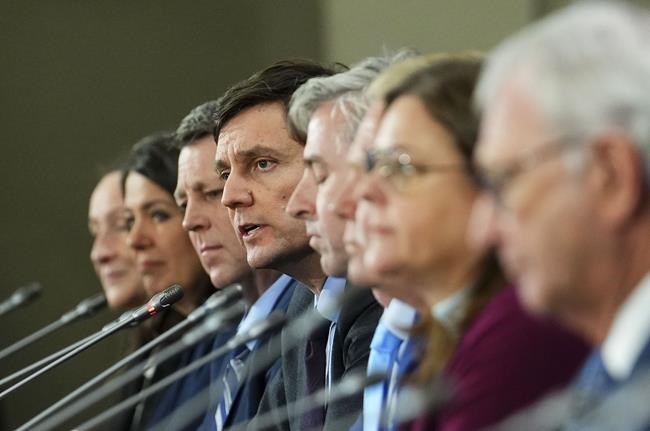LANGLEY, B.C. — Millions in immediate federal funding will make a difference in the "acute situation" in British Columbia's hospitals, especially in rural communities, Premier David Eby said Wednesday.
Eby joined Prime Minister Justin Trudeau to announce the British Columbia government signed an agreement in principle for $27.47 billion of health-care funding from the federal government over the next 10 years.
The deal is part of a $196-billion health-care funding proposal that Trudeau made to Canada's premiers last month.
Before the announcement, Trudeau and Eby met with nursing students at Kwantlen Polytechnic University in Langley, B.C., where they visited a classroom filled with hospital beds and mannequin patients.
The money for B.C. includes an immediate $273 million to address urgent needs, especially in pediatric hospitals and emergency rooms and to address long wait times for surgeries.
Eby said that cash will go toward supporting emergency care and overwhelmed hospitals.
"We know that the acute situation in many of our hospitals is particularly challenging in rural communities, where communities have lost doctors where the strain following the pandemic has hit particularly hard."
Both B.C. and Saskatchewan announced agreements in principle on Wednesday, leaving only Quebec and the territories to sign on to the federal health-care funding agreement.
Trudeau said the agreements are tailored for each province or territory, "but consistent among all is a joint responsibility to collect information that monitors how the health-care system is performing. So, we know that it is delivering the improvements that Canadians deserve."
The B.C. funding also includes a $3.32-billion bilateral agreement to help Canadians age in their homes, with access to home care or care in long-term care facilities.
The B.C. government said in a news release that its priorities for the additional cash will be to expand access to primary health care including in rural, remote, and Indigenous communities, reduce wait-lists, support health-care workers, improve access to quality mental health and substance-use services, and modernize health data systems.
B.C. Health Minister Adrian Dix said the agreement means the province will have access to even more life-saving services, closer to home.
"When people make the important decision to reach out for help, it's vital that services are available to meet them every step of their journey. That's why our government is continuing to make historic investments and add new supports to our mental health and substance-use system of care," Dix said in the news release.
More than 11,000 people have died in B.C. from illicit drug overdoses since B.C. declared a public health emergency in 2016.
Federal Health Minister Jean-Yves Duclos said the agreement with B.C. is an opportunity to improve the experience of health workers and those they care for.
"It will modernize our health-care system, improve access to family health services and mental health services, reduce surgical backlogs and support health workers. Better quality of care means helping British Columbia and Canadians live longer, healthier lives."
Ottawa has said the provinces must come up with specific plans for how they would spend the money and prove that their health-care systems are getting better.
The offer made by Trudeau to Canada's premiers included health transfers of $2 billion right away and annual increases of five per cent over the next five years, but only if each province agreed to conditions, including upgrading health data collection.
Trudeau said they know that fixing the health-care system is a big issue.
"We know we can't solve it overnight, but our government will continue pushing forward together with our partners, so that we can deliver real results for Canadians and uphold the principles of publicly funded universal health care that Canadians are so rightly proud of."
This report by The Canadian Press was first published March 1, 2023.
Brenna Owen, The Canadian Press




